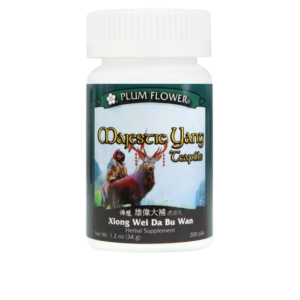Huang Jing
English Name: Solomon’s seal rhizome
Literal Translation: “yellow essence”
Pharmaceutical Name: Rhizoma Polygonati
Medica Category: Yin-Tonifying Herbs
Properties: Huang Jing enters the Spleen, Lung, and Kidney channels; it is sweet in nature and neutral in temperature.
What is Huang Jing?:
The Chinese Herb Huang Jing is dried rhizome from one of three different species of Solomon’s seal that grow naturally in different regions of the country:
- King Solomon’s seal (Polygonatum kingianum Coll et hemsl.)— which blooms in the Spring with beautiful orange flowers and grows in shady environments at mid-elevations in Guangxi, Guizhou, Sichuan and Yunnan provinces in China;
- Siberian Solomon’s seal (P. sibiricum Red.)—which also flowers in the spring with less showy, white flowers. It also grows in shady-type forest environments but is native to more northerly regions (e.g. Mongolia, Siberia, and Manchuria); and
- Many-flowered Solomon’s seal (P. cyrtonema Hua.)—flowers in the spring with green-tipped white flowers and grows in the same shady-type forest environments from Hubei to Guangzhou provinces.
Plants in the genus polygonatum are related to various species of asparagus and have similar characteristics to generate fluids and moisten the body to address yin deficiency in a wide variety of presentations (see also Yu Zhu, Tian Men Dong, and Mai Men Dong); Huang Jing is one of these herbs, and its specific uses in TCM are discussed directly below.
Traditional Chinese Medicine (TCM) Therapeutic Actions of Huang Jing:
Huang Jing nourishes yin and tonifies qi in the Lung and as such is an excellent choice to address chronic, deficient syndromes in the Lung that are characterized by dry, weak cough and dyspnea (sometimes with a little blood-streaked sputum if the dryness is severe). Being neutral in temperature, it is effective at treating dry cough that is accompanied by either heat or cold (depending on the other herbs with which it is combined in formula).
Huang Jing enters the Lung, Spleen, and Kidney channels to nourish yin and qi deficiencies of these organs that cause xiao ke (wasting and thirsting) syndrome. Xiao ke syndrome is characterized by common yin-deficiency heat signs (e.g. night sweats, tidal fever, five-center heat etc…) with the additional presentations of polyuria (increased urination), polyphagia (increased hunger not sated by eating), polydipsia (increased/extreme thirst), fatigue, shortness of breath, and irritability.
Huang Jing tonifies jing (essence) to address such clinical presentations as soreness of the lower back and knees, premature greying of the hair, dizziness, vertigo, and blurred vision. It is often taken as food (in soups with beef, pork, or chicken) of combined with other herbs in formula and taken “as medicine”.
Huang Jing mildly tonifies Spleen qi and yin and is added to formulas to address such clinical presentations as poor appetite, fatigue, dry mouth and a red tongue.
–safety/clinical notes:
Huang Jing is greasy and cloying in nature and may create dampness and stagnation and should be used with caution in persons with cough with profuse sputum, dampness in the middle jiao, or diarrhea/fullness in the abdomen from Spleen/Stomach deficiencies.




